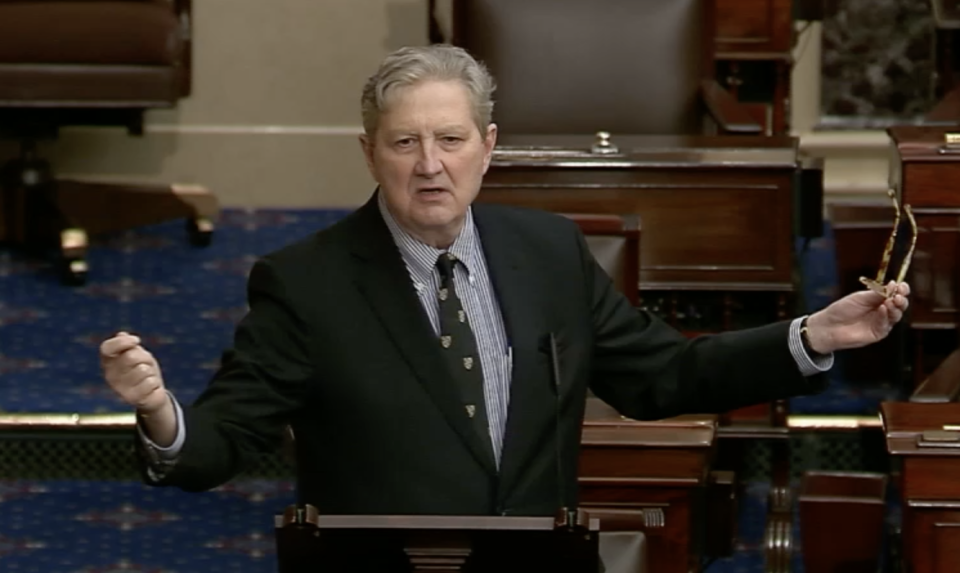
Chabert comes to aid of fellow workers’ families
November 23, 2010
LPSO deputies remembered via bike tour
November 25, 2010Near shore oil and gas production professionals expressed anger and frustration Monday following what was described as a closed and controlled 45-minute meeting with U.S. Interior Secretary Ken Salazar, Assistant Interior Secretary Tom Strickland and Bureau of Ocean Energy Management, Regulation and Enforcement Director Michael Bromwich.
The meeting was billed as taking place with the Shallow Water Drilling Coalition n an organization identified as shallow water operators representing their common interests.
In a session that participants implied carried content shallower than the levels they drill off the coast of Louisiana, business leaders and politicians said that Salazar’s words to them were more of the same with no real substance or new specific plans revealed.
“I thought it was extremely disappointing,” said Terrebonne Parish President Michel Claudet. “I was expecting a major announcement that would indicate the speed at which we could go back to drilling. Unfortunately, we didn’t get that assurance. In fact, it doesn’t appear that there is any less confusion in the permitting process than there was previously.”
The meeting took place at Gulf Island Fabrication Safety Training building in Houma, following a flyover of the Louisiana coast, during which Salazar said he and his entourage took a look at cleanup progress made since the April 20 explosion and spill from the BP Deepwater Horizon oil rig.
The session, according to Salazar’s communications director, Matt Lee-Ashley, was to cover reform easures and the implementation of standards to meet new policies.
Yet, according to participants there was nothing new from what Salazar had said in the past and little hope that anything might be forthcoming.
Salazar told members of the press that he was in Houma to make sure the commitment level of the president of the United States was clear to resident of the Gulf Coast of Louisiana.
“We are committed to moving forward with oil and gas development. That’s the policy position of the United States. The policy position of the president [as] oil and gas is part of our energy portfolio. We are committed as well to make sure it is done in the right way … in a way that is safe and protective of the environment,” Salazar told reporters.
Strickland said he noticed work crews in various places while taking an air tour of the Gulf. “Cleanup goes on full boar. There are still miles of heavily oiled coastline and marshes in Louisiana and throughout the Gulf Coast. I think there is still something like 8,200 people still involved throughout the Gulf Coast in active cleanup,” he said during the news conference.
Strickland said environmental work on the coast is transitioning from cleanup to restoration. “We’re working very hard at the Department of Interior, as well as our sister department NOAA, to accelerate the opportunity for early restoration projects that could be implemented in a matter of the next few months.”
Strickland did not specify when those restoration projects might begin and admitted that a formal process to getting the work done could take years to complete. “We’ve got to get to restoring [the eco-system] as soon as possible,” he said.
Bromwich, in contrast to what locals expressed, called the meeting “useful” regarding what can be done to move the process forward so more drilling permits can be granted.
Bromwich claimed that 16 shallow water permits have been issued since June and that only seven permits are pending. “We have an important regulatory responsibility to discharge,” he said.
Salazar and company skirted questions from the press, particularly when they focused on a specific timelines for restoring both deepwater and shallow water drilling to pre-spill levels, details on policy changes and new safety rules, and responses to what has been in affect, by the reduction of permits being processed, an ongoing moratorium on all offshore drilling.
“In terms of what we heard [in the meeting], we all came expecting, hoping for a new policy decision. A breakthrough in terms of permitting. At least a new set of permits issued. We heard none of that and quite frankly that was extremely disappointing,” said Sen. David Vitter following Salazar’s press appearance.
“What I and many others said is that fundamentally has to change. There is an enormous logjam in terms of permitting right now. So much so that it amounts to a de facto moratorium. That has to change. I think it is unprecedented for the federal government to react to any incident in this way,” Vitter said.
Vitter compared delays of getting the oil and gas production industry running following the BP deepwater oil spill and de facto moratorium to the fact that airlines were up and running one week following the terror attacks which made use of aircraft on Sept. 11, 2001.
Gulf Island Fabrication President and CEO Kirk Meche said that although he was pleased to host this meeting, he, like other local executives, was disappointed that no specifics were offered regarding plans or restoration of drilling permits.
“We were very disappointed in the fact that we were expecting some sort of announcement coming from [Salazar] in terms of maybe some listing of regulations or a jumpstart to the permitting process. We just didn’t hear that today,” Meche said.
Meche said that red tape associated with permits is keeping thousands of jobs idle along coastal Louisiana and would also explain how different offices offer different numbers on how many have been issued during the past seven months. “There are a number of permits you can get, but not all permits are to drill. And I think that is a bit of the smoke and mirrors game they are playing with us,” he said.
“While we had high expectations of this meeting we were severely disappointed that Secretary Salazar did not provide definitive policy decisions that will end the drilling permitting bottlenecks,” said Lori LeBlanc, executive director for the Gulf Economic Development Team.
“There was no progress today, but we are going to keep pushing [and] keep demanding a fundamental change,” Vitter said. “This virtual shutdown of the industry has to change. It’s horrible for the country [and] it’s horrible for our economy here in Louisiana.”
Interior Secretary Ken Salazar exited the Gulf Island Fabrication Safety and Training Building to waiting reporters following Monday’s meeting with the Shallow Water Drilling Coalition. MIKE NIXON










